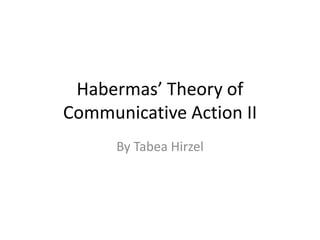HabermasŌĆÖ Theory of Communicative Action II
- 1. HabermasŌĆÖ Theory of Communicative Action II By Tabea Hirzel
- 3. Understanding Habermas: Universal understanding = truth Understanding always subjective = truth intersubjective phenomenon ┬® 2010 Tabea Hirzel
- 4. Rupture Habermas: through contextual application, caused by lack of (individual) consciousness and solidarity (recognition of a sameness) Recognition of objective truth is incomplete Rupture is a symptome of the problem Can be solved by progressive higher knowledge of truth Hey! Universal understanding is an illusion. Truth is not understanding. Truth is a phenomenon that is created by pluralistic truth-claims Rupture is the very process of life Is not solved as long live goes on ┬® 2010 Tabea Hirzel
- 5. Crisis Habermas: Caused by the encounter with new arguments The rupture is due to lack in rationality, knowledge and understanding Caused by nominal individuality The rupture is an opportunity for a learning process + A risk for failure ┬® 2010 Tabea Hirzel
- 6. Translation Habermas: Where two arguments colide they are translated into a higher abstraction (substant category) ’ā© which gives insight into a larger field of truth/ deeper understanding Categories are provisional idealizations of substance, phaenomena of the mindŌĆÖs learning process. Their definition shifts with every new noun in the set. ┬® 2010 Tabea Hirzel
- 7. Transformation Habermas: Communicative action integrates new particules into a set Is an empancipative action of the individual Communicative action transforms the identity of the set Is an emanzipative action of the indiviual ┬® 2010 Tabea Hirzel
- 8. Moral theory ŌĆó Deontological: act right because it is universally good (epistemological) ŌĆó Cognitive: mental- epistemological ŌĆó Formalistic ŌĆó Universalistic (territorial) ŌĆó realist ŌĆó Progressive-evolutionary Threefold good: What is good for me What is good for us What is good for them (prescriptive, tribal morality) ’ā© Ontological impossibility to define the right in universal terms Cognitive: existential-ontological Formalistic Nominalistic Irrealist (Nelson Goodman, Tondino ŌĆō pluralistic reality) Materialistic Fatalistic-evolutionary ┬® 2010 Tabea Hirzel
- 9. Problems with Consiousness & Identity ŌĆó Remarks on Hegel ŌĆó Marx: ┬½Between equal rights force decides┬╗ ┬® 2010 Tabea Hirzel









